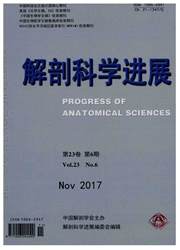

 中文摘要:
中文摘要:
目的探讨δ-catenin、Ki-67在非小细胞肺癌中的表达状况及其与临床病理学参数间的关系。方法利用免疫组织化学(ElivisionTM plus法),检测肺癌组织芯片中155例非小细胞肺癌患者δ-catenin、Ki-67的表达情况。结果肺癌组织的δ-catenin蛋白阳性表达率为61.30%(95/155),相应癌旁组织δ-catenin阳性表达率为35.6%(16/45),差别有显著意义(〈0.05)。δ-catenin在TNM III/IV期的NSCLC组织中阳性表达率为73.2%(41/56),明显高于在Ⅰ/II期NSCLC组织中阳性表达率54.5%(54/99,=0.022);δ-catenin在出现淋巴结转移的表达率为72.3%(60/83),显著高于没有淋巴结转移的阳性表达率48.6%(35/72,=0.003);非小细胞肺癌中δ-catenin高表达同Ki-67高表达呈显著正相关关系(χ2=12.685,r=0.282,〈0.01)。结论δ-catenin的高表达与非小细胞肺癌的分期,淋巴结转移及增殖有关。
 英文摘要:
英文摘要:
Objective To explore the expression and significance of δ-catenin,Ki-67 in non-small-cell lung cancer(NSCLC).Methods The expressions of δ-catenin and Ki-67 in 155 specimens of lung cancer were detected by immunohistochemistry in tissue microassay.Results The overexpression of δ-catenin was detected in 95(61.30%) of the 155 human lung cancer tissues,and significantly higher than that in normal lung tissues(35.6%).The positive expression of δ-catenin was higher in advanced TNM stages(III+IV) of NSCLC,compared to lower stages(I+II)(=0.022).A correlation between δ-catenin expression and lymph node metastasis was found in our study(=0.003).Besides,we also found that the overexpression of δ-catenin was positively correlated with Ki-67 in NSCLC(χ2=12.685,r=0.282,0.01).Conclusion The overexpression of δ-catenin is correlated with advanced pTNM stage,lymph nodal metastasis and proliferative ability of NSCLC.
 同期刊论文项目
同期刊论文项目
 同项目期刊论文
同项目期刊论文
 期刊信息
期刊信息
